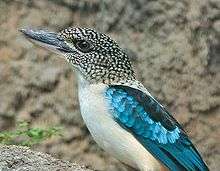Kookaburra
| Kookaburra | |
|---|---|
 | |
| Laughing kookaburra in Tasmania, Australia | |
| Scientific classification | |
| Kingdom: | Animalia |
| Phylum: | Chordata |
| Class: | Aves |
| Order: | Coraciiformes |
| Family: | Halcyonidae |
| Genus: | Dacelo Leach, 1815 |
| Species | |
 |
The call of a kookaburra
|
| Problems playing this file? See media help. | |
Kookaburras are terrestrial tree kingfishers of the genus Dacelo native to Australia and New Guinea, which grow to between 28–42 cm (11–17 in) in length. The name is a loanword from Wiradjuri guuguubarra, onomatopoeic of its call. The single member of the genus Clytoceyx is commonly referred to as the shovel-billed kookaburra.
The kookaburra's loud call sounds like echoing human laughter. They are found in habitats ranging from humid forest to arid savanna, as well as in suburban areas with tall trees or near running water. Even though they belong to the larger group known as "kingfishers", kookaburras are not closely associated with water.
Classification and species
Four species of kookaburra can be found in Australia, New Guinea, and the Aru Islands.

Kookaburras are sexually dimorphic. This is noticeable in the blue-winged and the rufous-bellied, where males have blue tails and females have reddish-brown tails.
- Rufous-bellied kookaburra (Dacelo gaudichaud). (lowland New Guinea, Saibai island)
- Spangled kookaburra (Dacelo tyro). (Aru Islands, southern New Guinea)
- Blue-winged kookaburra (Dacelo leachii). (northern Australia, southern New Guinea)
- Laughing kookaburra (Dacelo novaeguineae). (native to eastern Australia, introduced to southwest Australia)
Unusually for close relatives, the laughing and blue-winged species are direct competitors in the area where their ranges now overlap. This suggests that these two species evolved in isolation (possibly during a period when Australia and New Guinea were more distant – see Australia-New Guinea.
Behaviour
Kookaburras are almost exclusively carnivorous, eating mice, snakes, insects, small reptiles, and the young of other birds; they have also been known to take goldfish from garden ponds. In zoos they are usually fed food for birds of prey.
The most social birds will accept handouts and will take meat from barbecues. It is generally not advised to feed kookaburras ground beef or pet food as these do not include enough calcium and roughage.[1]
They are territorial, except for the rufous-bellied, which often live with their young from the previous season.[2] They often sing as a chorus to mark their territory.

Conservation
All kookaburra species are listed as Least Concern. Australian law protects native birds including kookaburras.
In culture
Olly the Kookaburra was one of the three mascots chosen for the 2000 Summer Olympics in Sydney. The other mascots were Millie the Echidna and Syd the Platypus.
The distinctive sound of the laughing kookaburra's call is used in filmmaking and television productions, as well as certain Disney theme park attractions, regardless of African, Asian and South American jungle settings. Kookaburras have also appeared in video games (Lineage II, Battletoads, and World of Warcraft) and at least in one short story (Barry Wood's Nowhere to Go).
In William Arden's 1969 book, The Mystery of the Laughing Shadow, (one of 'The Three Investigators' series for young readers), the laughing kookaburra is integral to the plot.
The children's television series Splatalot! includes an Australian character called "Kookaburra" (or "Kook"), whose costume includes decorative wings that recall the bird's plumage, and who is noted for his distinctive high-pitched laugh.
Music
- A well-known children's song, "Kookaburra"
- "Kookaburra", by Cocteau Twins, released on their EP Aikea-Guinea
- "Kookaburra" by John Vanderslice on 2007's Emerald City (album)
- The Kookaburras, an English band from the County Durham.
- The lyric "...the Laughing Kookaburras call.." appears in the song Across the Hills of Home on the album Something of Value by Eric Bogle
BFD Records and BFD Productions, which are the distributors and/or copyright holders of most of the garage rock and psychedelic rock compilation albums in the Pebbles series, have the address Kookaburra, Australia.
Postage stamps

- A six pence stamp was issued in 1914.
- A three pence commemorative Australian stamp was issued for the 1928 Melbourne International Philatelic Exhibition,
- A six pence stamp issued in 1932.
- A 38c Australian stamp issued in 1990 features a pair of kookaburras.[3]
Coins
An Australian coin known as the Silver Kookaburra minted annually since 1990.[4]
Yacht
The Australian 12 metre yacht Kookaburra III lost the America's Cup in 1987.[5]
Hockey
The Australian Men's Hockey team is named after the kookaburra. They are currently (as of 2014) world champions in field hockey.[6]
References
- ↑ Giles, Jennie (1994). "Caring for Wild Birds in Captivity Series (Adelaide and Environs): Caring for Kookaburras" (PDF). Bird Care & Conservation Society South Australia Inc. Retrieved 26 August 2015.
- ↑ Legge, Sarah (2004). Kookaburra: King of the Bush. Collingwood, Vic: CSIRO Publishing. ISBN 978-0-643-09063-7. OCLC 223994691.
- ↑ Bird Stamps of Australia
- ↑ "Australian Kookaburra". Silver Bullion World. Retrieved 4 November 2013.
- ↑ Maritime Topics On Stamps, America Cup, Sailing
- ↑ Hockey Australia: Kookaburras
Further reading
- Kookaburra sketches and calls at the Australian National Botanic Gardens site. Archived from the original on 2008-07-20. Retrieved 2010-09-03.
External links
| Wikimedia Commons has media related to Dacelo. |
| Look up kookaburra in Wiktionary, the free dictionary. |
